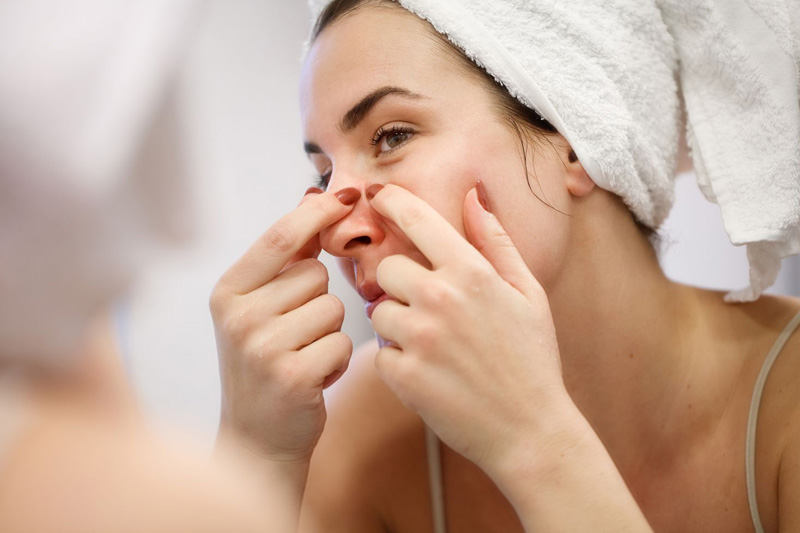How Stress and College Life Can Trigger Acne

College is often described as one of the most exciting chapters of life. Between classes, social events, part-time jobs, and late-night study sessions, it’s a time of growth and self-discovery. But it’s also a time when stress levels soar, sleep becomes irregular, and quick, unhealthy meals take precedence over balanced nutrition. Unfortunately, these factors can wreak havoc on your skin, leading to acne flare-ups just when you least need them.
If you’re dealing with stubborn breakouts during your college years, you’re not alone. Here’s how the typical college lifestyle can contribute to acne and, more importantly, what you can do to keep your skin clear and healthy.
Why College Life Can Be a Breeding Ground for Acne
1. Stress: The Skin’s Worst Enemy
The demands of college life—assignments, exams, and juggling social commitments—can leave you feeling overwhelmed. When your body is stressed, it produces higher levels of cortisol, a hormone that can increase oil production in your skin. This excess oil clogs pores, leading to breakouts.
Additionally, stress can weaken your immune system, making it harder for your skin to fight off acne-causing bacteria.
2. Irregular Sleep Schedules
Late-night study marathons and Netflix binges often disrupt your sleep schedule. Poor sleep impacts your body’s ability to repair itself, including your skin. When you don’t get enough sleep, your cortisol levels remain elevated, exacerbating acne.
Lack of sleep also reduces the production of melatonin, a hormone that helps protect your skin from environmental damage, further contributing to breakouts.
3. Poor Diet and Acne
College life is synonymous with instant noodles, greasy pizza, and sugary snacks—all quick fixes during a busy schedule. However, these foods can spike your blood sugar, leading to increased insulin levels. Elevated insulin promotes the production of sebum (oil), which can clog your pores and lead to acne.
Additionally, dairy and processed foods are often linked to inflammation, another trigger for acne flare-ups.
4. Lack of a Consistent Skincare Routine
Skincare routines often take a backseat between rushing to class and catching up on sleep. Neglecting to cleanse, moisturise, and exfoliate regularly can allow dirt, oil, and dead skin cells to build up, worsening acne.
Strategies to Keep Acne Under Control
While it’s impossible to avoid stress and late nights altogether, there are practical steps you can take to minimise the impact of college life on your skin.
1. Manage Stress Effectively
- Practice Mindfulness: Techniques like meditation, deep breathing, or yoga can help lower stress levels. Even a few minutes a day can make a difference.
- Stay Active: Regular exercise is not only great for your physical health but also helps reduce stress hormones.
- Set Boundaries: Learn to say no to unnecessary commitments. Prioritising your mental well-being is key.
2. Prioritize Sleep
- Stick to a Schedule: Aim for at least 7–8 hours of sleep each night, even during exam weeks.
- Create a Relaxing Routine: Wind down before bed with activities like reading or listening to calming music. Avoid screens at least an hour before sleep.
- Power Naps: If long nights are unavoidable, a 20–30 minute nap during the day can help your body recharge.
3. Opt for Skin-Friendly Foods
- Hydrate: Drink plenty of water throughout the day to keep your skin hydrated.
- Choose Whole Foods: Incorporate fruits, vegetables, whole grains, and lean proteins into your meals.
- Limit Sugary and Greasy Foods: While you don’t have to eliminate them completely, moderating your intake can help reduce acne triggers.
- Snack Smarter: Swap chips for nuts or fruit, which are less likely to aggravate your skin.
4. Stick to a Simple Skincare Routine
- Cleanse Twice Daily: Use a gentle cleanser to remove dirt and oil, especially after a long day.
- Moisturize: Even if you have oily skin, a lightweight moisturiser can help maintain your skin’s balance.
- Target Acne: Use products containing salicylic acid or benzoyl peroxide to treat breakouts.
- Sunscreen: Protect your skin from UV damage with a non-comedogenic sunscreen.
- Don’t Overdo It: Over-exfoliating or using too many products can irritate your skin, making acne worse.
5. Seek Professional Help When Needed
If your acne persists despite your best efforts, consider consulting a dermatologist. Clinics like Neuglow The Aesthetic Doctors offer treatments tailored to acne-prone skin, including medical-grade peels, laser therapy, and light-based treatments that target breakouts effectively.
Maintaining Healthy Skin Through Busy Times
Acne is often a frustrating part of college life, but with some proactive changes, you can manage it effectively. By controlling stress, improving your sleep and diet, and sticking to a consistent skincare routine, you’ll not only keep your skin clearer but also feel more confident tackling everything college throws your way. Remember, there’s no one-size-fits-all solution for acne. If you’re struggling, don’t hesitate to seek professional advice. Your skin deserves the same care and attention as the rest of you, especially during these transformative years.





